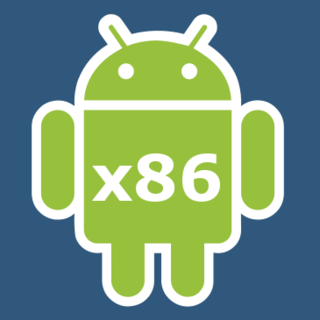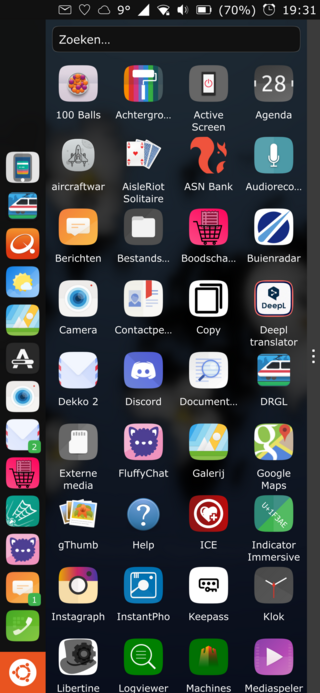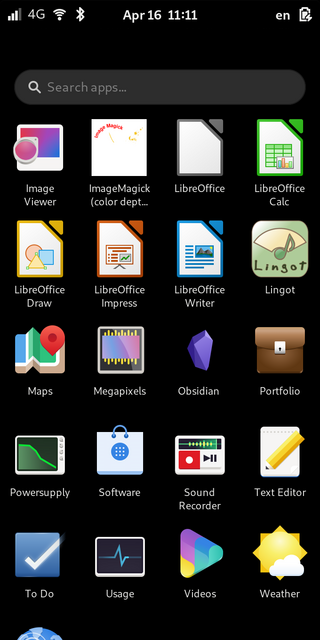
A Linux distribution is an operating system made from a software collection that includes the Linux kernel and often a package management system. Linux users usually obtain their operating system by downloading one of the Linux distributions, which are available for a wide variety of systems ranging from embedded devices and personal computers to powerful supercomputers.

In computing, a windowing system is a software suite that manages separately different parts of display screens. It is a type of graphical user interface (GUI) which implements the WIMP paradigm for a user interface.
Hardware abstractions are sets of routines in software that provide programs with access to hardware resources through programming interfaces. The programming interface allows all devices in a particular class C of hardware devices to be accessed through identical interfaces even though C may contain different subclasses of devices that each provide a different hardware interface.
Computer operating systems based on the Linux kernel are used in embedded systems such as consumer electronics, in-vehicle infotainment (IVI), networking equipment, machine control, industrial automation, navigation equipment, spacecraft flight software, and medical instruments in general.
HAL is a software subsystem for UNIX-like operating systems providing hardware abstraction.
A mobile operating system is an operating system for smartphones, tablets, smartwatches, smartglasses, or other non-laptop personal mobile computing devices. While computers such as typical/mobile laptops are "mobile", the operating systems used on them are generally not considered mobile ones, as they were originally designed for desktop computers that historically did not have or need specific mobile features. This line distinguishing mobile and other forms has become blurred in recent years, due to the fact that newer devices have become smaller and more mobile unlike hardware of the past. Key notabilities blurring this line are the introduction of tablet computers and light-weight laptops and the hybridization of the two in 2-in-1 PCs.

Android-x86 is an open source project that makes an unofficial porting of the Android mobile operating system developed by the Open Handset Alliance to run on devices powered by x86 processors, rather than RISC-based ARM chips.

Replicant is a free operating system (OS) based on the Android mobile platform that intends to replace all proprietary Android components with free-software counterparts. It is available for several smartphones and tablet computers. It is written in the same programming languages as Android. The modifications are mostly in the C language; the changes are mostly to the lower-level parts of the OS, such as the Linux kernel and drivers that use it.

Mer was a free and open-source software distribution, targeted at hardware vendors to serve as a middleware for Linux kernel-based mobile-oriented operating systems. It is a fork of MeeGo.

Sailfish OS is a Linux-based operating system based on free software, and open source projects such as Mer as well as including a closed source UI. The project is being developed by the Finnish company Jolla.

Ubuntu Touch is a mobile version of the Ubuntu operating system, being developed by the UBports community. Its user interface is written in Qt, and is designed primarily for touchscreen mobile devices such as smartphones and tablet computers, but the original goal of convergence was intended to bring Ubuntu Touch to laptops, desktops, IOT devices and TVs for a complete unified user experience.

Maliit is an input method framework for computers with particular focus on implementing virtual keyboards. Designed mostly for touchscreen devices, Maliit allows the inputting of text without the presence of a physical keyboard. More advanced features such as word correction and prediction are also available.
Besides the Linux distributions designed for general-purpose use on desktops and servers, distributions may be specialized for different purposes including computer architecture support, embedded systems, stability, security, localization to a specific region or language, targeting of specific user groups, support for real-time applications, or commitment to a given desktop environment. Furthermore, some distributions deliberately include only free software. As of 2015, over four hundred Linux distributions are actively developed, with about a dozen distributions being most popular for general-purpose use.
Linux for mobile devices, sometimes referred to as mobile Linux, is the usage of Linux-based operating systems on portable devices, whose primary or only Human interface device (HID) is a touchscreen. It mainly comprises smartphones and tablet computers, but also some mobile phones, personal digital assistants (PDAs) portable media players that come with a touchscreen separately.

AsteroidOS is an open source operating system designed for smartwatches. It is available as a firmware replacement for some Android Wear devices. The motto for the AsteroidOS project is "Free your wrist."

postmarketOS is an operating system primarily for smartphones, based on the Alpine Linux distribution.

The PinePhone is a smartphone developed by Hong Kong-based computer manufacturer Pine64, intended to allow the user to have full control over the device. Measures to ensure this are: running mainline Linux-based mobile operating systems, assembling the phone with screws, and simplifying the disassembly for repairs and upgrades. LTE, GPS, Wi-Fi, Bluetooth and both cameras can be physically switched off. The PinePhone ships with the Manjaro Linux-based operating system using the Plasma Mobile graphic interface, although other distributions can be installed by users.
The JingPad A1 is a Linux based tablet developed by Jingling. The JingPad A1 was released in 2021. The tablet is using its own JingOS Linux distribution which is based on the Android hardware layer Halium and KDE Plasma mobile. Ubuntu Touch has been ported to the tablet. The device is using a Unisoc Tiger T510 SOC, has 8GB of RAM and a maximum of 256GB storage. It has a pencil and attachable keyboard accessories.

Mobian is a project to port the Debian Linux distribution running the mainline Linux kernel to smartphones and tablets. The project was announced in 2020. It is available for the PinePhone, PineTab, Librem 5, OnePlus 6/6T and Pocophone F1. Droidian is a version of Mobian which runs top of Android's variant of the Linux kernel and the Libhybris and Halium adaptation layer, and works with devices which are supported by Ubuntu Touch. It can be installed using UBports installer.











